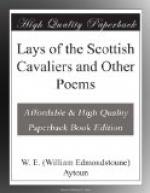On commencing his march into England, Charles found himself at the head of an army of between five thousand and six thousand men, which force was considered strong enough, with the augmentations it might receive on the way, to effect the occupation of London. Had the English Jacobites performed their part with the same zeal as the Scots, it is more than probable that the attempt would have been crowned with success. As it was, the Prince succeeded in reducing the strong fortified town of Carlisle, and in marching, without opposition, through the heart of England, as far as Derby, within one hundred miles of the metropolis. But here his better genius deserted him. Discord had crept into his councils; for some of the chiefs became seriously alarmed at finding that the gentry of England were not prepared to join the expedition, but preferred remaining at home inactive spectators of the contest. Except at Manchester, they had received few or no recruits. No tidings had reached them from Wales, a country supposed to be devoted to the cause of King James, whilst it was well known that a large force was already in arms to oppose the clans. Mr. Chambers gives us the following details. “At a council of war held on the morning of the 5th December, Lord George Murray and the other members gave it as their unanimous opinion that the army ought to return to Scotland. Lord George pointed out that they were about to be environed by three armies, amounting collectively to about thirty thousand men, while their own forces were not above five thousand, if so many. Supposing an unsuccessful engagement with any of these armies, it could not be expected that one man would escape, for the militia would beset every road. The Prince, if not slain in the battle, must fall into the enemy’s hands: the whole world would blame them as fools for running into such a risk. Charles answered, that he regarded not his own danger. He pressed, with all the force of argument, to go forward. He did not doubt, he said, that the justice of his cause would prevail. He was hopeful that there might be a defection in the enemy’s army, and that many would declare for him. He was so very bent on putting all to the risk, that the Duke of Perth was for it, since his Royal Highness was. At last he proposed going to Wales instead of returning to Carlisle; but every other officer declared his opinion for a retreat. These are nearly the words of Lord George Murray. We are elsewhere told that the Prince condescended to use entreaties to induce his adherents to alter their resolution. ‘Rather than go back,’ he said, ‘I would wish to be twenty feet under ground!’ His chagrin, when he found his councillors obdurate, was beyond all bounds. The council broke up, on the understanding that the retreat was to commence next morning, Lord George volunteering to take the place of honour in the rear, provided only that he should not be troubled with the baggage.”




